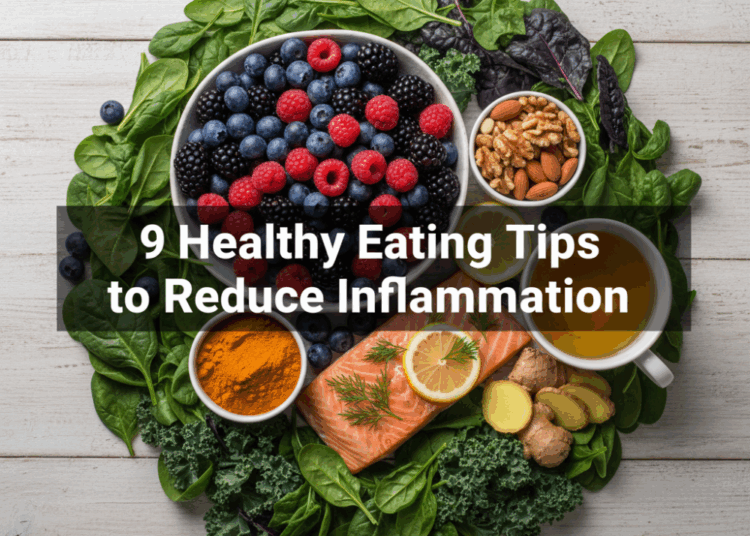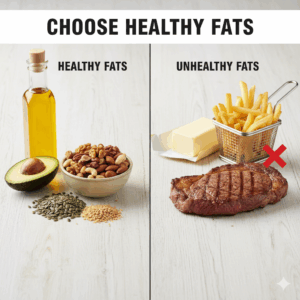Understanding Inflammation
In recent years, inflammation has become a buzzword in health and wellness discussions. But what exactly is it, and why does it matter?
Inflammation is a natural response of the body’s immune system. It helps protect against infections, injuries, or toxins. Acute inflammation—like redness, swelling, or pain after a cut—signals that the body has started the healing process.
The concern lies with chronic inflammation, a low-grade but long-lasting condition that can persist for months or even years. Studies have linked chronic inflammation to serious health issues such as:
-
Heart disease
-
High blood pressure
-
Type 2 diabetes
-
Certain cancers
-
Chronic pain
-
Dementia
-
Anxiety and depression
-
Autoimmune conditions
The good news? Lifestyle and dietary choices can significantly influence inflammation levels. By following anti-inflammatory eating habits, you can help reduce risk factors and improve your overall health.
Causes of Chronic Inflammation
Several elements contribute to inflammation, some within our control and others not. Common causes include:
-
Poor dietary habits
-
Smoking and tobacco use
-
Alcohol consumption
-
Lack of physical activity
-
Poor sleep quality
-
Ongoing infections
-
Environmental pollutants
-
High stress
Among these, diet stands out as one of the most effective ways to manage inflammation. Let’s explore nine healthy eating tips to help reduce inflammation naturally.
9 Healthy Eating Tips to Reduce Inflammation
1. Eat Plenty of Fruits and Vegetables
Aim for at least six half-cup servings of produce daily. Brightly colored fruits and vegetables are packed with antioxidants, vitamins, and minerals that protect the body from inflammatory damage.
2. Choose High-Fiber Carbohydrates
Limit processed carbs like white bread, crackers, and sugary cereals. Instead, choose whole grains—oats, quinoa, brown rice, barley—and fiber-rich vegetables like sweet potatoes, squash, and beets.
3. Prioritize Fiber Intake
Most people only consume about half the recommended daily fiber. Women should aim for 25 grams per day, and men should target 38 grams. Both soluble and insoluble fiber are crucial for digestion, blood sugar balance, and lowering cholesterol.
4. Focus on Plant-Based and Lean Proteins
Incorporate protein from beans, lentils, nuts, seeds, and soy products. For animal protein, opt for lean sources like chicken, turkey, or fish. Limit red meat and avoid processed meats, which may increase inflammation.
5. Be Mindful of Fats
Cook with unsaturated oils like extra virgin olive oil or avocado oil. Avoid trans fats in fried foods and keep saturated fats—like butter, fatty meats, and high-fat dairy—limited.
6. Balance Omega-6 and Omega-3 Fats
Boost your intake of omega-3 rich foods such as salmon, sardines, flax seeds, chia seeds, and walnuts. At the same time, reduce omega-6 heavy oils often found in processed foods, like soybean and corn oil.
7. Cut Back on Added Sugars
Excess sugar is a leading driver of inflammation. Men should limit added sugar to 36 grams per day and women to 24 grams. Watch out for hidden sugars in bread, sauces, and even yogurt.
8. Limit Alcohol Consumption
Too much alcohol disrupts the gut microbiome, contributing to inflammation. If you choose to drink, stick to one drink or less per day.
9. Add Anti-Inflammatory Teas and Spices
Incorporate teas such as green, black, or white, which are rich in antioxidants. Spices like turmeric, ginger, garlic, cinnamon, and cayenne also help combat inflammation.
Consistency Matters Most
The key to managing chronic inflammation isn’t a single meal—it’s a consistent pattern of healthy, anti-inflammatory eating. By following these nine tips, you can take meaningful steps toward lowering inflammation and improving overall well-being.
👉 Stay ahead with insights on health, wellness, and business trends. Explore IMPAAKT — your go-to top business magazine for thought leadership and global perspectives.
















